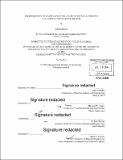Investigation of causes and structure of social attitudes concerning nuclear radiation
Author(s)
Chandra, Aditi, S.M. Massachusetts Institute of Technology
DownloadFull printable version (8.665Mb)
Other Contributors
Massachusetts Institute of Technology. Department of Nuclear Science and Engineering.
Advisor
Michael W. Golay.
Terms of use
Metadata
Show full item recordAbstract
An individual's perception of radiation, termed as "Radiation Attitudes" in this work, is vital for understanding the stakeholder relationship dynamics for acceptance of controversial nuclear technology projects. Attitudes towards nuclear technology have been found to be different from those towards other technologies perceived as hazardous, such as hydraulic fracturing, genetic engineering or biohazard facilities. Even within the subset of nuclear technology, different applications invoke different reactions. Medical uses of the technology are generally viewed as positive, whereas nuclear power plants and radioactive waste management facilities can sometimes cause fear and anxiety in the minds of some people. This work explains the causes and structure of Radiation Attitudes, and the dynamics of the various factors influencing them. A historical analysis of the narratives concerning nuclear technology was used to identify the complex, social, political, cognitive and technological factors that played a significant role in the formation of Radiation Attitudes. A system dynamics approach was utilized to construct causal loop diagrams depicting the cause-effect relationships and interdependencies between the identified variables. Qualitative interviews were conducted to test the causal relationships hypothesized in the model for Radiation Attitudes. The purpose of the interviews was to understand individual beliefs that result in a particular Radiation Attitude, the bases for these beliefs, and the process of their formation. The interviews enabled verification of the variables and relationships in the model, and the identification of the most significant interdependencies and links. The hypothesized model for Radiation Attitudes correlated well with the information inferred from the interviews, making the first stage of validation a success.
Description
Thesis: S.M., Massachusetts Institute of Technology, Department of Nuclear Science and Engineering, 2014. Cataloged from PDF version of thesis. Includes bibliographical references (pages 140-144).
Date issued
2014Department
Massachusetts Institute of Technology. Department of Nuclear Science and EngineeringPublisher
Massachusetts Institute of Technology
Keywords
Nuclear Science and Engineering.